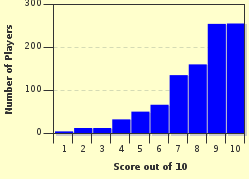Quiz Answer Key and Fun Facts
1. Let's start off with the one that leaped to mind when I saw the title. In 1757, the Empress Maria Theresa created an Order named after herself. While not actually awarded for disobedience to orders, the Order could only be won by "successful military acts of essential impact to a campaign that were undertaken on [the officer's] own initiative, and might have been omitted by an honorable officer without reproach," which certainly includes a clever disobedience to orders. The Order was awarded until 1918, when the empire that awarded it collapsed. What country honored its officers with the Military Order of Marie Theresa?
2. In 1801, the British and Danish fleets fought the Battle of Copenhagen. The British were commanded by Admiral Sir Hyde Parker, with Vice-Admiral Lord Horatio Nelson as second-in-command. As the battle heated up, Admiral Parker gave Nelson the order to withdraw, an order he expected Nelson to disobey. Nelson did disobey the order, but claimed he could not obey the order because he could not see it. What fact gave Nelson's claim some plausibility?
3. One of the most famous cases where orders should have been disobeyed, or at least questioned, is the Charge of the Light Brigade. The Charge, made famous by Alfred, Lord Tennyson's poem in 1854, involved both a misinterpreted order and personal animosity. In which war did the Charge of the Light Brigade occur?
4. Of course, the most extreme examples of orders that should have been disobeyed concerns the Holocaust. The defense of "I was just obeying orders" was used at the Nuremberg Trials (even though it was specifically barred) and is now known as "The Nuremberg Defense." At a lower level, though, there's another defense, that if the party had disobeyed the order, they would have been killed for their insubordination. Approximately how many German soldiers were killed for refusing an order to participate in the Holocaust?
5. While we're on the subject of Nazi War Crimes, one of the more repugnant (like mass murder isn't repugnant enough) events was a set of medical experiments performed by doctors with more interest in answering questions than any shred of human decency. Which one of these acts was NOT performed in the name of science?
6. On July 1, 1916, the British Army experienced the single bloodiest day in its history. By the end of the day, the Army had lost 57,000 men, virtually destroying the formations involved. (The First Newfoundland Regiment, for example, suffered a casualty rate of 91%.) One of the reasons that the casualties were so high is that the British planners assumed that the German trenches and barbed wire would be destroyed by artillery bombardment. Had anyone checked, they would have notice that the fortifications were largely intact. What's the name of the battle?
7. In 1992, the USS Saratoga fired two missiles into the bridge of the Turkish destroyer TCG Muavenet, killing five people. The launch occurred because the officers supervising a missile-firing drill failed to notice that the orders being issued by an operator indicated firing a live missile rather than a simulation. There's a term for this type of situation, where someone or something gets shot by their own side. (Some people cite it as an oxymoron, but it's still used.) What is it?
8. In November 1942, the Russian Army closed a ring around the German Sixth Army, resulting in its isolation and eventual destruction in February 1943. The Russians were able to isolate the Sixth Army because Hitler had set his sights on a particular city, leaving Sixth Army's flanks to be guarded by inferior Italian, Hungarian, and Romanian units. The Germans launched an offensive to relieve the forces trapped in the city, but the offensive failed, partially because Field Marshal Paulus obeyed Hitler's orders to stand fast and did not attempt to break out of the city. What's the name of the battle?
9. Okay, the only chance we have of avoiding atrocities is if people refuse to obey certain orders. But we can't just let everyone vote on what orders they want to obey - after all, many orders go against the strong instinct for self-preservation. So, in the US Military, orders are presumed to be lawful (and must be obeyed) unless they are "patently illegal." What's an example of a "patently illegal" order?
10. July 3, 1863. The third day of the Battle of Gettysburg. General Robert E. Lee, in command of the Confederate States' Army of Northern Virginia, is up against Major General George Meade and the United States' Army of the Potomac. Lee hit the Union left on the first day, he tried the Union right on the second, and now he's ordered a massed assault on the center. Despite a preliminary bombardment, the attack is a disaster. 12,500 men leave the Confederate front, and 6,000 come back. What's the name for Lee's failed attack?
Source: Author
Correspondguy
This quiz was reviewed by FunTrivia editor
bloomsby before going online.
Any errors found in FunTrivia content are routinely corrected through our feedback system.

